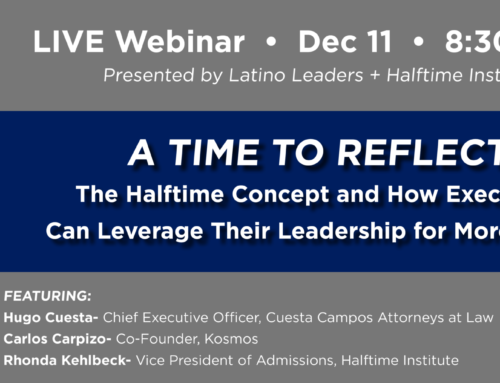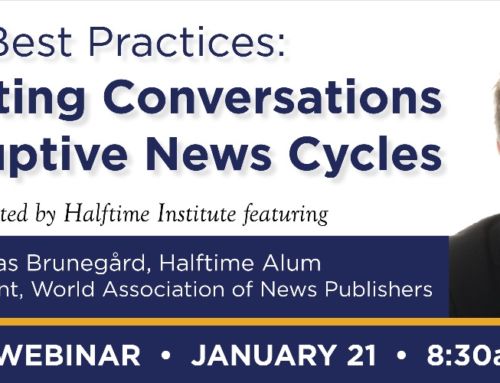This isn’t an article about romance. It isn’t about marriage. But it is about relationships: true, authentic peer relationships. Trust me when I tell you that you don’t want ride the waves of life without them.
At the Halftime Institute, we serve men and women going through a season of discernment and re-focusing. For many leaders, by mid-life, high-stakes busyness has crowded out heart-level connections and by the time they get to halftime, the deficit shows.
If that describes you, then it’s time for a serious one-eighty. Relationships are too important to the halftime journey for them to rank with low (or no) priority. In fact, it is impossible to be successful without them.
Bob Buford always said, “Real change happens over time with others.” There are three elements to that statement. “Real change” speaks to those of us who don’t want to do dribs and drabs. We aren’t content with the status quo and we want true transformation. “Over time” connotes that we have to be patient. And “with others” means we have to be serious about finding an authentic peer group for the journey.
Here’s a short list of why a close-knit group of friends and peers is so important:
- We need to hear what other people say. As diverse as other people’s experiences and perspectives are, the takeaway is that we’re all human. No superheroes.
- We need chances to be open. Vulnerability opens you to community and it’s a learned quality. In a group, you can take reasonable chances, make mistakes, learn all the things you can’t control, and reap benefits.
- We need to hear ourselves. To say my thoughts out loud, instead of just looping through my head, is to almost hear them for the first time.
- We need honest pushback, both ways. We need a friend who can say, “What’s up with that?” – whatever that is. Especially for high-level leaders; unvarnished honesty is at a rare premium.
- We need accountability. We break vows to ourselves that we wouldn’t break to another person. Enough said.
- The health benefit. I’ve heard it said that 75 percent of psychotherapy goes on between friends and I believe it. It’s physically, spiritually, and psychologically helpful to have a release valve. Just Google “heart,” “cholesterol,” and “stress”: bottling up your tension is a recipe for bad health.
For years, a guy on our team wanted a circle of men to look at life with – not necessarily in a Bible study setting, but through the lens of the Bible – to set goals and help each other grow. But he put it off. One day, his wife came back from a prayer walk on the beach and said to him, “I know you’re supposed to form that group,” which got him off his duff. He talked to nineteen guys, men he admired for things like their faith, business expertise, and marriages. Then, he set the bar high: meetings the first Friday of every month for two years, only two absences allowed per year. When he approached men with the idea, of the sixteen who said yes, fourteen told him they were craving it. Two, when they heard the invitation, cried. Every man who said yes was desperate for help and relationships, but someone had to step out and make the first move. At the eighteen-month mark, the group stabilized at eleven guys.
The fine print on the friendship warning label, you ask? As you get into one or a few friendships, you’ll run into unexpected parts of yourself. Lisa said to me one day, “You never used to cry. Now you cry all the time.” In my thirties, I had no tears. In my fifties, and with people I trust, they just come.
And, I’m OK with that.
Friends stir up authenticity and authenticity holds surprises. Once you sample it, you’ll want more.






